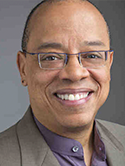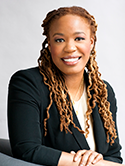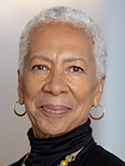‘How did we get here?’: StraightTalk series examines structural racism
Each year since 2011, The Riley Institute and the Osher Lifelong Learning Institute at Furman – joined recently by South Carolina ETV – have collaborated to present a public discussion of timely issues for the Upstate. Their mission is right there in the title of the series: StraightTalk.
“What we’ve always tried to do with the series is bring real information that is not ideologically based to deal with those critical issues that confront our community and our state,” says Donald Gordon, executive director of The Riley Institute and professor of politics and international affairs. “The bottom line is to focus on something in a deliberate and intensive way that is actually data-based and research-based.”
The issues are weighty, and the discussions are frank. In past years, nationally recognized experts have shared the McAlister Auditorium stage with Furman faculty and Greenville community members to discuss voting rights, healthcare reform, poverty and education, among other topics.
This year’s subject, structural racism, has been simmering culturally for decades and came to a head in 2020 – with not only the deaths of George Floyd and other unarmed Black Americans drawing attention to police brutality and racial violence, but also the disproportionate harm the COVID-19 pandemic has done to communities of color, says Jill Fuson, director of The Riley Institute’s Center for Critical Issues.
“When you look at the laws and policies that have been put in place historically, there’s no way of denying” structural racism in the United States, Fuson says.
“We want to address not so much the individual acts of racism, which might be based on a personal ideology or prejudice,” she says, “but rather what systems are in place and how did we get here.”

Jeffery Robinson.

Heather McGhee.

Angela Glover Blackwell.
The first of 2021’s three StraightTalk sessions, “Shaped by Racism: America Then and Now,” will be Aug. 31, featuring a virtual appearance by Jeffery Robinson, head of the Who We Are Project and former director of the ACLU’s Trone Center for Justice and Equality. Monica Bell ’03, a Yale professor specializing in criminal justice, welfare law, housing, race and sociology, and Brittany Arsiniega, assistant professor of politics and international affairs at Furman, will join the discussion in person.
On Sept. 7, StraightTalk continues with “Structural Racism: Impeding the American Dream for Us All.” Economic and social policy expert and author Heather McGhee will join virtually, with South Carolina Public Radio reporter Thelisha Eaddy, Furman Vice President for Academic Affairs and Provost Ken Peterson, former South Carolina Gov. Richard W. Riley, Greenville Mayor Pro Tem Lillian Brock Flemming, United Way of Greenville County CEO Meghan Barp and TD Bank executive David Lominack on the onstage panel.
StraightTalk concludes its 2021 series on Sept. 14 with “Dismantling Racism: Why Now Is a Moment for Change.” Angela Glover Blackwell, founder in residence at PolicyLink, will virtually join a panel made up of MDC President John Simpkins, Spartanburg Academic Movement Executive Director Russell Booker, and South Carolina ETV’s Gavin Jackson.
In-person attendance at all three events is open to Furman students, faculty and staff only. The general public can access the events through Zoom for $10 per session or $25 for the whole series.
Fuson hopes the discussions can inspire the attendants to move beyond zero-sum thinking.
“There’s this idea that if I do something that helps you, then I have to give something up,” she says. “But that’s not how it works. We all benefit if we address racism in America. We’re all in this together.”
She also believes the sessions may open the audience’s eyes to specific historic institutional policies, such as redlining and housing discrimination, that have led to continued racial inequities. But most of all, she says, she hopes people come away from StraightTalk hungry for more… straight talk.
“We want to spark conversations,” she says. “We hope students will take what they’ve learned and talk with their peers in classrooms or in the dining hall or in a dorm room – or that folks from the community could have additional conversations with their colleagues.”